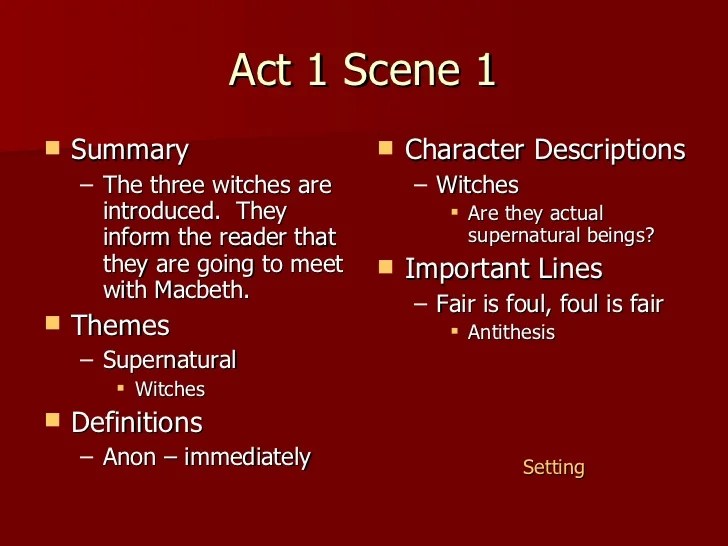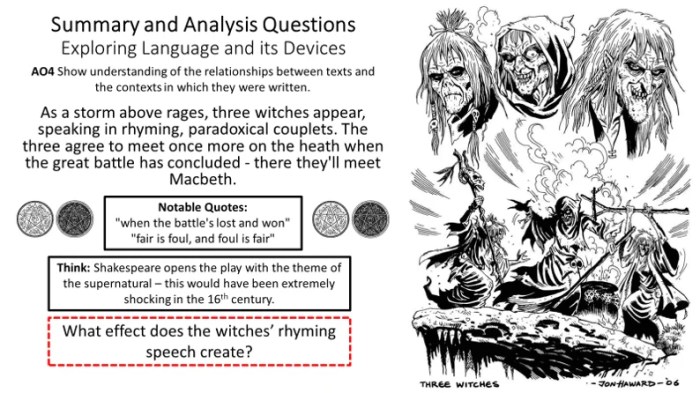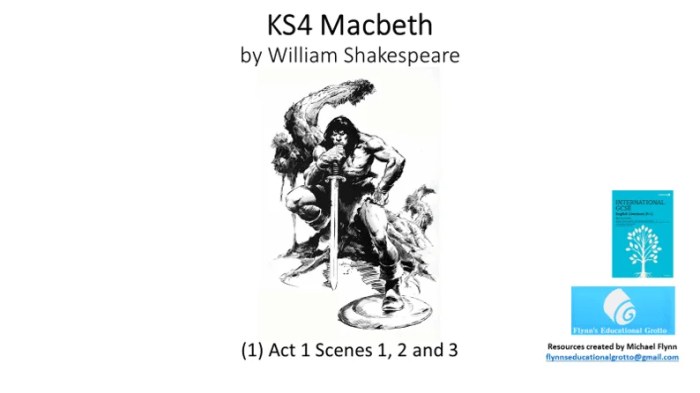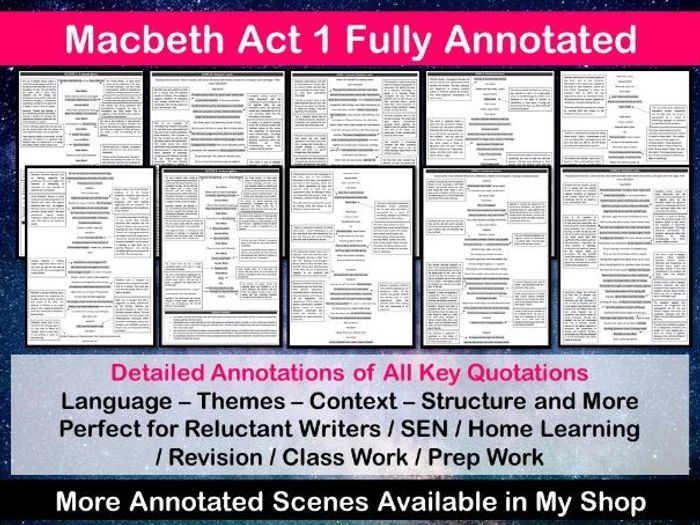Macbeth act 1 reading guide – Embark on a captivating journey through Macbeth Act 1 with this comprehensive reading guide. Delve into the intricate world of Shakespeare’s iconic tragedy, where ambition, guilt, and the supernatural collide in a mesmerizing tale.
As we navigate the treacherous path of Act 1, we will encounter the enigmatic witches, witness Macbeth’s fateful encounter with the prophecies, and explore the complex character developments that set the stage for the play’s tragic climax.
Introduction
Act 1 of William Shakespeare’s tragedy, Macbeth, holds immense significance as it establishes the play’s central conflict and introduces the characters who drive the plot.
The play revolves around the ambitious Scottish general, Macbeth, who is tempted by three witches to seize the throne. Driven by his ambition and the influence of his wife, Lady Macbeth, Macbeth commits a series of heinous crimes that ultimately lead to his downfall.
Characters
The play introduces a cast of complex and compelling characters, each playing a crucial role in the unfolding tragedy:
- Macbeth: A brave and ambitious general who is corrupted by his desire for power.
- Lady Macbeth: Macbeth’s ambitious and ruthless wife, who drives him to commit murder.
- The Witches: Three mysterious figures who tempt Macbeth with prophecies of greatness.
li> Duncan: The noble and benevolent king of Scotland, who is murdered by Macbeth.
Setting and Atmosphere
The setting of Act 1 of Macbethis crucial in establishing the play’s dark and foreboding atmosphere. The play opens on a desolate heath, a barren and unforgiving landscape that reflects the turmoil within the characters’ minds. This desolate setting immediately sets the tone for the tragedy that is to follow.
The language and imagery used in Act 1 further contribute to the sense of atmosphere. The witches’ incantations, with their references to darkness, blood, and evil, create a sense of foreboding and unease. The use of imagery associated with storms and chaos, such as “thunder” and “lightning,” further emphasizes the turbulent nature of the events that are about to unfold.
The Impact of the Setting
The desolate setting of the heath has a profound impact on the characters. The barrenness and unforgiving nature of the landscape mirrors the inner turmoil of Macbeth and Lady Macbeth. The witches, who appear on the heath, represent the forces of darkness and chaos that will ultimately lead to the characters’ downfall.
The Witches and the Prophecies
The witches play a pivotal role in Act 1, setting in motion the tragic events that unfold. They encounter Macbeth and Banquo on the heath and deliver three prophecies to Macbeth:
- That he will become Thane of Cawdor
- That he will become Thane of Glamis
- That he will become King
These prophecies have a profound impact on Macbeth, stirring his ambition and leading him down a path of darkness. He becomes obsessed with fulfilling the witches’ words, even if it means committing heinous crimes.
The Significance of the Prophecies, Macbeth act 1 reading guide
The witches’ prophecies are significant for several reasons:
- They plant the seeds of ambition in Macbeth’s mind.
- They create a sense of inevitability, as if Macbeth’s fate is already predetermined.
- They foreshadow the tragic events that will befall Macbeth and his loved ones.
Macbeth’s response to the prophecies is a key turning point in the play. He chooses to embrace his ambition, even though he knows it will lead to violence and destruction.
Macbeth’s Character Development: Macbeth Act 1 Reading Guide

Macbeth’s character undergoes a significant transformation throughout Act 1. Initially portrayed as a noble and valiant warrior, he gradually succumbs to ambition and darkness.
Influence of the Witches’ Prophecies
The witches’ prophecies play a pivotal role in Macbeth’s descent into evil. Their words ignite his ambition, leading him to contemplate the possibility of becoming king. The prophecies create a sense of destiny, making Macbeth believe that his actions are predetermined.
Macbeth’s Internal Conflict
Macbeth experiences a fierce internal conflict between his desire for power and his moral conscience. He knows that murdering Duncan is wrong, but his ambition ultimately outweighs his morality.
As you prepare for your Zeta Phi Beta Final Test , it’s essential to revisit key literary works like Macbeth. Our Macbeth Act 1 Reading Guide provides a comprehensive overview of the play’s opening scenes, helping you understand the characters, themes, and plot points that set the stage for the tragic events to come.
Lady Macbeth’s Influence
Lady Macbeth serves as a catalyst for Macbeth’s downfall. Her ruthless ambition and manipulative nature drive him towards committing the murder. She appeals to his insecurities and manipulates his fears, playing a crucial role in his decision to kill Duncan.
Macbeth’s Ambition
Macbeth’s insatiable ambition is the primary driving force behind his actions. He is willing to do whatever it takes to achieve power, even if it means sacrificing his honor and morality.
Macbeth’s Guilt and Remorse
After murdering Duncan, Macbeth is consumed by guilt and remorse. He experiences hallucinations and nightmares, indicating his mental and emotional turmoil. His conscience weighs heavily on him, causing him to question his actions.
Lady Macbeth’s Character Development

Lady Macbeth is a complex and ambitious character who plays a significant role in Act 1 of Macbeth. She is a strong-willed woman who is driven by her desire for power and influence.
Lady Macbeth’s motivations are complex. She is ambitious for her husband, Macbeth, and she believes that he has the potential to be a great king. However, she is also aware of his weaknesses, and she is determined to help him overcome them.
Lady Macbeth’s Influence on Macbeth
Lady Macbeth has a profound influence on Macbeth. She is the one who convinces him to kill King Duncan and seize the throne for himself. She is also the one who provides him with the emotional support he needs to carry out his plan.
Lady Macbeth is a powerful and dangerous character. She is a master manipulator, and she is able to use her intelligence and cunning to get what she wants. However, she is also a deeply flawed character, and her ambition ultimately leads to her downfall.
Dramatic Structure

Act 1 of Macbeth is structured to introduce the main characters, establish the play’s setting and atmosphere, and set the plot in motion. It consists of seven scenes, each serving a specific purpose in building the play’s tension and foreshadowing the tragic events to come.
The use of foreshadowing and dramatic irony adds depth and suspense to the play. Foreshadowing hints at future events, creating a sense of anticipation and dread, while dramatic irony occurs when the audience knows something that the characters do not, intensifying the emotional impact.
Scene-by-Scene Analysis
- Scene 1:Introduces the witches and their prophecies, setting the stage for the play’s supernatural and ominous atmosphere.
- Scene 2:Introduces Macbeth and Banquo, establishing their bravery and ambition. Macbeth’s encounter with the witches plants the seeds of his downfall.
- Scene 3:King Duncan praises Macbeth and announces his intention to stay at Macbeth’s castle, leading to Lady Macbeth’s sinister plot.
- Scene 4:Macbeth struggles with his conscience but ultimately decides to kill Duncan, revealing his growing ambition and moral decay.
- Scene 5:Lady Macbeth manipulates Macbeth into committing the murder, showing her ruthlessness and determination.
- Scene 6:Duncan is murdered, and Macbeth and Lady Macbeth plant false evidence to avoid suspicion.
- Scene 7:Macbeth is crowned king, but his guilt and paranoia begin to torment him, foreshadowing his eventual downfall.
Themes and Motifs
Act 1 of Macbeth introduces several key themes and motifs that will be developed throughout the play. These elements contribute significantly to the play’s overall meaning and atmosphere.
One of the most prominent themes is that of ambition. Macbeth’s burning desire for power drives him to commit heinous crimes, ultimately leading to his downfall. The play explores the destructive consequences of unchecked ambition and the moral decay that can result from it.
The Supernatural
The supernatural plays a crucial role in Act 1, setting the stage for the play’s dark and ominous tone. The witches’ prophecies and the appearance of Banquo’s ghost foreshadow the tragic events to come. The supernatural elements add a sense of mystery and dread to the play, blurring the lines between reality and the supernatural.
Symbolism and Imagery

The use of symbolism and imagery in Act 1 of Macbeth is pervasive and multifaceted, enhancing the play’s themes and characterization.The play opens with the eerie imagery of the witches and their incantations, creating a sense of foreboding and the supernatural.
Their presence symbolizes the disruption of the natural order and the potential for chaos. The weather conditions, such as the thunder and lightning, also reflect the internal turmoil of Macbeth and Lady Macbeth, foreshadowing the violent events to come.
Blood and Violence
Blood is a recurring symbol in Act 1, representing both physical and psychological violence. Macbeth’s hallucination of the bloody dagger foreshadows his descent into murder and tyranny. The witches’ prophecies, with their references to “blood will have blood,” reinforce the inevitability of violence and the cycle of retribution.
Light and Darkness
Light and darkness are used to symbolize good and evil, respectively. Macbeth’s gradual descent into darkness mirrors his moral decay, as he succumbs to the temptations of power and ambition. Lady Macbeth’s invocation of darkness in her soliloquy, “Come, thick night,” reflects her desire to conceal their crimes and embrace evil.
Sleep and Dreams
Sleep is associated with peace and innocence, while dreams can reveal hidden truths and fears. Macbeth’s inability to sleep after the murder of Duncan symbolizes his guilt and the loss of his moral compass. Lady Macbeth’s sleepwalking and her attempts to wash away the imaginary bloodstains from her hands reflect her psychological torment and the burden of her crimes.
Literary Devices

Act 1 of Macbeth is a literary masterpiece, rich in language and style. Shakespeare employs various literary devices to create a captivating and immersive experience for the reader.
One striking device is the use of imagery. Vivid and evocative language paints vivid pictures in the reader’s mind, creating a sense of immediacy and atmosphere. For instance, the witches’ incantation, “Double, double toil and trouble; Fire burn and cauldron bubble,” conjures a vivid image of the witches’ dark and sinister rituals.
Metaphor
Metaphors abound in Act 1, creating powerful comparisons that enhance the play’s language. For example, Macbeth’s ambition is likened to a “vaulting ambition” that “o’erleaps itself and falls on the other side,” highlighting the dangers of unchecked ambition.
Foreshadowing
Shakespeare also uses foreshadowing to create a sense of suspense and dread. The witches’ prophecies, such as “All hail, Macbeth! that shalt be king hereafter,” hint at the tragic events that will unfold.
Irony
Irony is another device employed in Act 1. The contrast between the characters’ expectations and the audience’s knowledge of their eventual fate creates a sense of dramatic irony. For instance, Macbeth’s initial reluctance to kill Duncan is ironic, as the audience knows that he will ultimately commit the murder.
FAQs
What is the significance of Act 1 in Macbeth?
Act 1 establishes the play’s setting, characters, and central conflict. It introduces the witches and their prophecies, which set Macbeth on a path towards his downfall.
How does the setting of Act 1 contribute to the atmosphere of the play?
The stormy and desolate setting of Act 1 creates a sense of foreboding and unease, reflecting the inner turmoil of the characters and foreshadowing the tragic events to come.